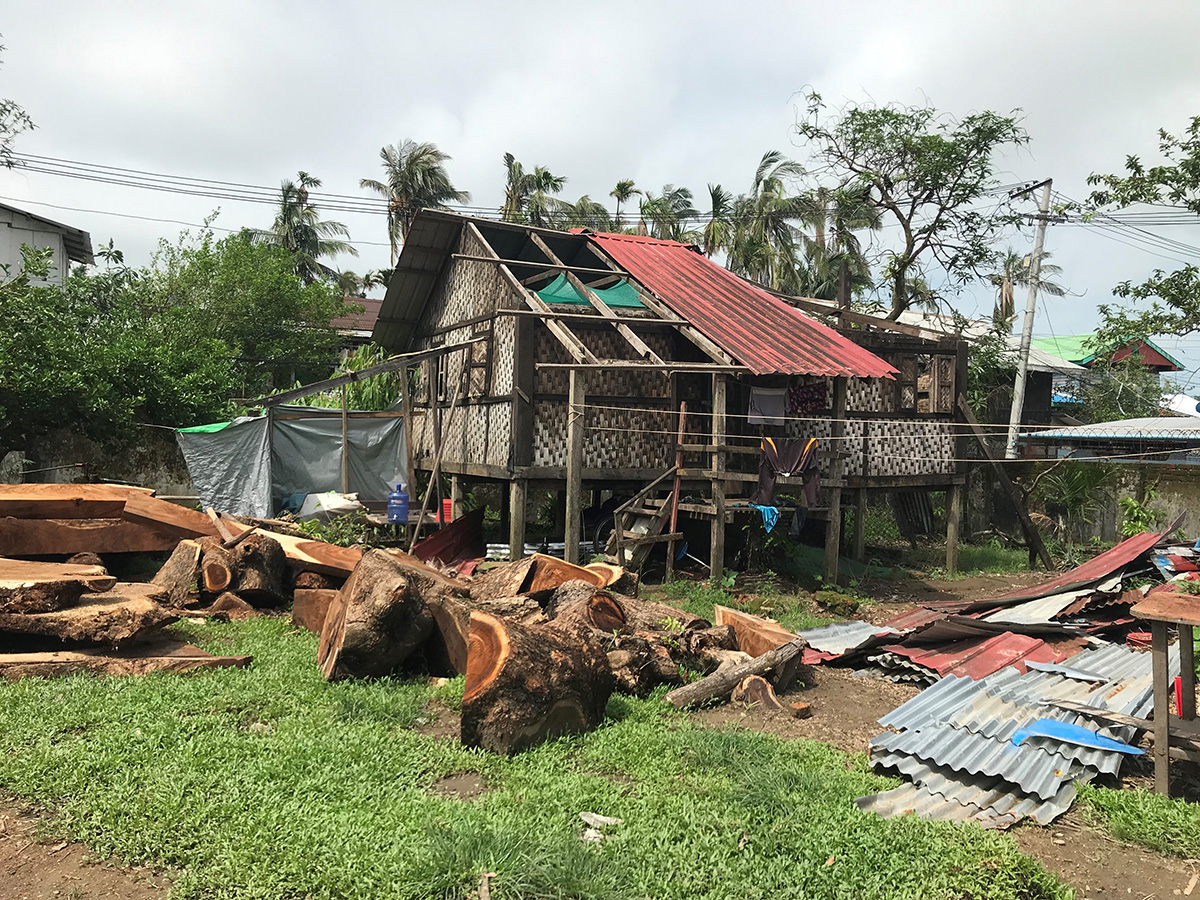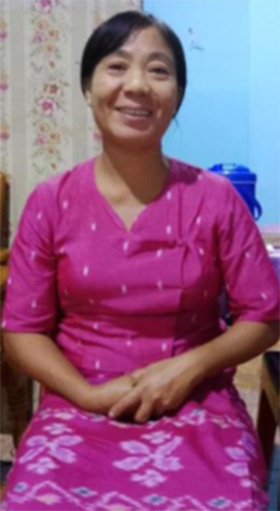Cyclone Mocha emergency response update
Cyclone Mocha hit Myanmar on 14 May 2023, causing widespread destruction. Rakhine State was the most affected, with 90% of its buildings suffering extensive damage, particularly in the capital city of Sittwe.
Church Committees established well before the disaster
The Disaster Management Committee of AID’s partner, the Church of the Province of Myanmar (CPM), played a crucial role in the emergency response. It had been established in 2008 after Cyclone Nargis and was revived in July 2022. Well before the cyclone struck, the committee conducted workshops to assess disaster management capacity, appointed focal persons in each diocese, and implemented a response plan with three phases: pre-cyclone, emergency response, and recovery. The role of the focal persons was to raise awareness about the importance of disaster management at diocesan meetings and within parish programs.
How the Church responded following news of the cyclone
When news came that cyclone Mocha was about to hit, the Disaster Management Committee swiftly assembled an elite response group comprising 8 members and 2 advisors, which urged people in vulnerable areas to seek refuge and gather essential supplies.
As a result, two villages near Pathein City managed to find safer shelter, people from Gwa in the Rakhine region took refuge on high ground, and some people in Sittwe moved to safer locations, while others prepared crucial resources at Sittwe’s Cathedral. It’s a story of quick thinking and effective action in the face of a looming disaster.
Immediate Response
The emergency response phase involved mobilizing aid for affected regions, particularly in Sittwe City, where communication and services were disrupted.
Detailed information on the extent of the impact remained elusive even two weeks after the cyclone. The committee worked to establish contact with the affected areas and estimated the number of people in need of essential supplies such as food, water, and medicine.
In the meantime, cash support was provided to people from the Gwa missionary region and Pathein Diocese, as their communication channels were operational. Once communication with Sittwe Diocese was re-established, emergency cash support was provided to people there. A comprehensive report on damages and the number of affected individuals and households was compiled and updated over time.
While the committee initially aimed to distribute supplies directly, logistical challenges and the sensitivity of local authorities made cash support the preferred option. AID supported CPM’s response with $20,000. The emergency support efforts concluded by the end of May 2023.
Recovery and Resettlement
As part of the recovery/resettlement phase, the committee successfully distributed cash support to a total of 114 affected households. The primary objective of this support was to assist those households in repairing their buildings damaged by the cyclone. Each household received about AUD $200, aimed to empower the affected families to undertake necessary repairs and reconstruction.
Those who donated, including AID supporters, received words of appreciation from several people.
The Bishop of the Diocese of Sittwe, the Rt Rev’d Dr James Min Dein, said:
Thank you so much to everyone who helped after the cyclone. I prayed and talked to the CPM committee, and I’m really happy to be working together. The congregation members now have stronger faith and feel the kindness of everyone. I appreciate all the donors, both local and international. Please keep us in your prayers.
The bishop’s sentiments were echoed by the Dean of Cathedral, Diocese of Sittwe, the Rev’d Hlaing Win:
I’m thrilled to be a bridge in this endeavor, drawing from my personal experiences to now work with effectiveness and efficiency. Serving as a priest, I’ve earned the trust and respect of our community members. Heartfelt thanks go out to our generous donors and the dedicated mediators supporting our activities. Overcoming challenges, we faced hurdles in obtaining accurate data due to communication issues. Time constraints made timely assistance challenging when everything was seemingly stable (though it remains unstable to this day). Monitoring all targeted communities proved demanding in the given circumstances.
A staff member of CPM recounts the story of one farmer, Daw Aung Lun’s, tremendous loss, and eventual recovery.
In a quiet part of Sittwe, a part of Myanmar badly affected by Cyclone Mocha, a farming family of three found their lives shattered when the cyclone hit in May 2023.
Mocha claimed the life of Daw Aung Lun’s husband and destroyed their simple home. Their farm animals roamed wild in search of food. When she was able to assess the damage, Daw Aung Lun found that her home was beyond repair, so she sought refuge in a local monastery.
Here, she found that her community, including AID’s partner, the Church of the Province of Myanmar, rallied around her, offering both sympathy and practical help. Daw Aung Lun saw the generosity of the donors to the church’s appeal, including both local people and AID supporters, as a testament to the kindness and compassion that exists even in the most challenging times.
After some time, her home was rebuilt, and the farm animals found and returned to her. She and her daughter were able to resume farming.
Daw Aung Lun extends her heartfelt gratitude to all who gave generously. She also realised that her story was one of not only one of loss but also of resilience, community, and the unwavering presence of divine grace. Because of those who helped, she had found the strength to rebuild her life.

A house in Sittwe partly damaged by the cyclone. © CPM. Used with permission.
